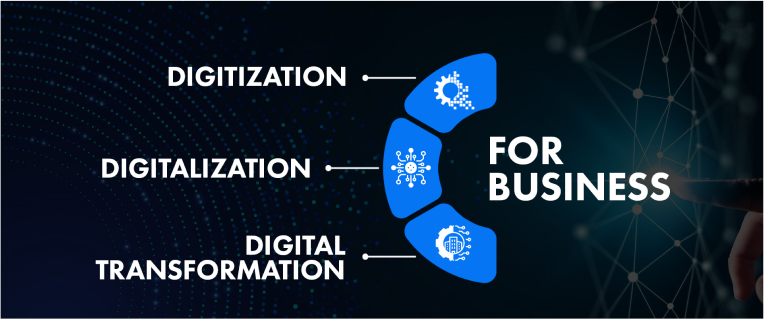It’s confusing when you heard the terms digitize, digitization, and digital transformation at once. You might think it all means the same. But it is not what you think. Here is this blog you will find out about Digitization Vs Digitalization Vs Digital Transformation. And how they differ from each other
What Does It Mean To Digitization?
What Is Digitalization?
Distinguishing digitization from digitalization may appear to be a minor point. but the two concepts are highly distinct and have very different effects. Digitalization is the conversion of business processes to digital technologies in order to increase the efficiency and revenue of the business.
“The use of digital technologies and digitized data to impact how work gets done, revolutionize how customers and companies engage and interact, and create new (digital) revenue streams,” according to one relevant definition of digitalization.
In a nutshell, digitalization is impossible without digitization. To return to our paper-to-digital-files-on-a-computer example, a digitalization initiative could include uploading these files to the cloud to transform collaboration and reporting processes, as well as using analytical tools to generate insights and actionable knowledge to mitigate risk and promote efficiency in future projects.
Digitalization encompasses the ability of digital technology to acquire and analyze data to make better business decisions and enable new business models, as opposed to digitization, which is the act of turning current data and processes digital.
What Is Digital Transformation, And How Does It Work?
Digitalization is a critical step in the digital transformation process, with significant implications for products, service delivery, and people.
It signifies a change in an organization’s culture, redefining how value is created and business is performed.
More than just applying technology to current businesses, digital transformation is the ability to quickly adapt as needed through the intelligent use of technologies and information.
“Digital transformation” is defined as “the fundamental and accelerating transformation of company activities, processes, capabilities, and models in a purposeful and prioritized approach to fully harness the changes and possibilities provided by digital technology and their influence across society.”
To tie it all together, it’s a broader strategy and ongoing purpose that relies on the integration of digitized data and digitalized applications.
What Is The Importance Of Digital Transformation?
The ultimate purpose of digital transformation is to boost human and organizational productivity and creativity (decision making, connectedness, invention, and augmentation).
Smart devices, cloud and computing, advanced analytics, social media & networking, intelligent systems, and machine intelligence are all examples of technologies that enable unprecedented access to pools of information and resources, leading to increased innovation and outcomes.
Digital transformation aims to take advantage of the possibilities and opportunities given by new technology in a faster, better, and more innovative way, in addition to significantly expanding the reach of companies.
As a result, good strategies realize that the final aim will continue to shift, as true digital transformation, like change and digital innovation, is a continuous process.
In essence, digital transformation enables firms to become flexible, allowing them to quickly identify, respond, and adapt to changes in customer and employee expectations and needs, as well as the broader business landscape.
Useful link- Why digital transformation is essential for business growth?
What Is The Difference Between Digitization And Digitalization?
The primary premise is that digitalization is impossible without digitization.
Digitalization is the use of digital technologies and digitized data to impact how work is done, transform how customers and companies engage and interact, and create new (digital) revenue streams.
Digitization is the conversion of analog to digital. Internal process optimization (e.g., job automation, paper minimization) that results in cost savings is referred to as digitization.
Digitalization, on the other hand, is a strategy or process that extends beyond the use of technology to indicate a more fundamental change in the entire business model and the evolution of work.
What Is The Difference Between Digitalization And Digital Transformation?
Although business leaders frequently use the term “digitalization” to refer to both digital transformation and digitalization, the two are not interchangeable.
Digital transformation necessitates a much wider acceptance of digital technologies as well as a culture shift.
People are more important than technology when it comes to digital change.
It necessitates customer-centric organizational reforms that are backed by leadership, driven by radical corporate culture challenges, and the use of technology that empowers and enables employees.
Conclusion
The industry’s expectations extend beyond project completion to include the creation of jobs, environmental enhancement, regional regeneration, and increased accessibility.
More crucially, the sector is capable of delivering these project outcomes and can generate much-needed societal reform by prioritizing the maximizing of social value.
The first steps in a digital transformation path are digitization and digitalization.
Understanding the differences between these concepts is critical for developing a sustainable digital transformation plan, determining where your company stands on this path, and maximizing the benefits of each step individually.

